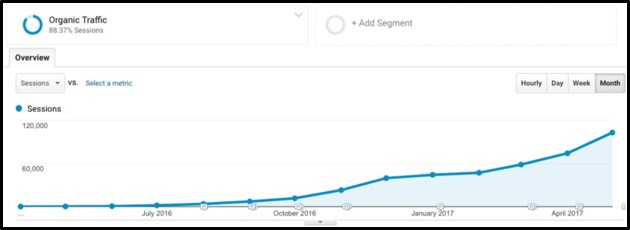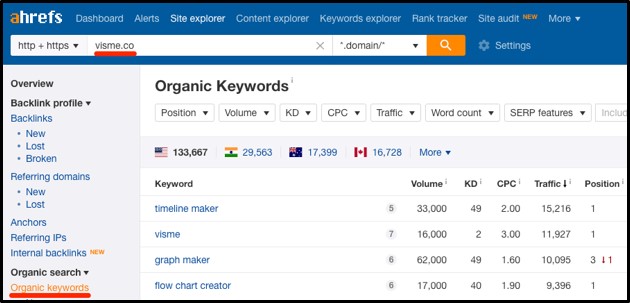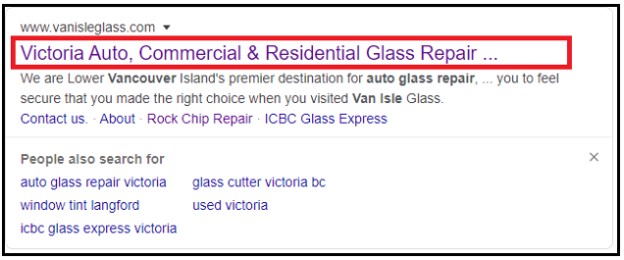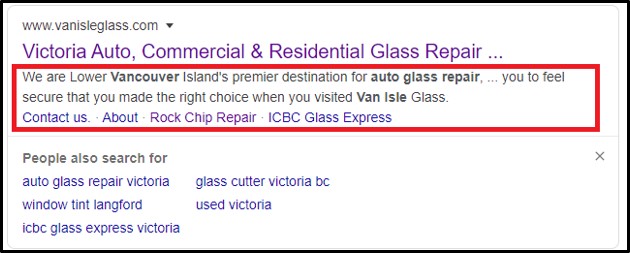What is SEO Management (& Why do You NEED It)

Hand off the toughest tasks in SEO, PPC, and content without compromising quality
Explore ServicesAre your competitors breaking ahead of you with just the power of better SEO management?
It’s quite possible.
In the last few years, the demands of SEO have changed a lot. To succeed today, you need a strategy in place. It needs to be one that allows you to track and work on dozens of different search engine ranking factors at the same time.
In this guide, you’re going to learn the meaning of SEO management. You’ll also learn what it takes to manage SEO effectively, and how an SEO management service can allow you to focus on what you do best.
Let’s start with a quick refresher on what SEO means now:
What is SEO?
Search Engine Optimization (SEO) occurs when you change onsite and offsite factors to make a page (or entire site) more effective at reaching search engine users.
What works best for SEO is largely determined by the rules that search engines set for themselves. For Google, this is done with an automated algorithm that judges whether pages are relevant enough to appear in response to a search.
At one time, getting that algorithm’s attention was as simple as spamming a website with one keyword over and over. That same practice will get you ignored or even directly penalized now.
What changed for SEO?
The algorithms released by Google in recent years have become far more resistant to being gamed with simple tricks than previous versions.
Modern SEO requires a careful balance of many different factors, including content, links, page-load speed, and being mobile-friendly.
Even a single one of those factors (content, for example) has become more complex. The algorithm is more capable than ever of judging whether you’re naturally using language.
It can also sniff out whether your content is riddled with errors, easy to read, or whether two blogs you’ve written are about roughly the same information.
SEO is not a one-person job. Increasingly, the only effective way to deploy an SEO strategy is to look at it as one mission that involves coordinating a team of different experts and resources.
This is SEO management.
What is SEO Management?
SEO management refers to the process of planning and controlling all the factors that can help you achieve your search engine goals.
Even a little awareness can make a huge difference, as this graph from a Search Engine Land case study shows:

The difference in traffic you see here happened after basic SEO standards were applied to the site.
The more complex SEO becomes, the more important it is that you have a big picture of what you’re trying to do and how to make it happen:
- Do you want your business to be first for one specific search?
- Do you want it to appear across an entire range of related searches?
- Do you want to drive more foot traffic from nearby mobile searches?
Achieving any of these goals will mean focusing on a different set of key terms, link partners, and content standards. The purpose of SEO management is to drive all of the resources toward that one goal.
This is a role that often requires the full-time attention of an SEO manager who can develop the goals and coordinate all the people involved. That can mean a lot of different people.
Sidenote: What does an SEO manager do?
When hired, managers take over the direction of your SEO for you. They often help you across the entire optimization cycle by providing insight into what needs to be fixed and then actioning the solutions.
A small or medium-sized business in a competitive, online-dependent niche is likely to need help a few times a year from SEO-related experts such as:
- web developers
- graphic designers
- content & keyword strategists
- PPC ad strategists
It can be expensive to maintain a team like this all year long. That’s why many businesses turn to SEO management services that bundle these services together.
Whether you decide to go in-house or delegate to a service, you need to understand what is being done. Effective SEO management results from the development of 4 important elements of success.
What are the 4 Elements of effective SEO management?
Now you understand what an SEO manager does, but you may still be wondering how that translates into better SEO performance? That’s what you’re going to learn in this section.
The best practices of online marketing management can change pretty fast, but managing the following items will give you a foundation to launch all types of successful strategies.
If you want to succeed at SEO management right now, this is what it’s going to take:
- Identify your demand with keyword research
- Benchmark the competition
- Create and optimize content
- Measure your results
Let’s explore each one of them in a little more detail:
1) Identify your demand with keyword research
Keyword research remains an important part of any SEO strategy, and it should be the first focus of your SEO managers.

As a practice, keyword research has changed a lot. “Keywords” no longer have much value on their own. Instead, the goal of keyword research is to discover the natural language that is being used by your target audience.
Your research should reveal the words they are using to describe products and services, and what other topics are typically brought up at the same time.
In most cases, you want to define your purpose to your audience as specifically as possible (even if you intend to branch out in the future).
Here’s an example of a Vancouver, BC business that has carefully crafted its content around terms that clearly define its location and services.

Nearly every sentence here offers a solution the reader might need, elaborates on the geographic location, or gives the next course of action to take.
In addition to helping you discover the right terms, keyword research helps you understand the priority of those terms. You can use traffic data to discover what services you offer are most in demand.
While keyword research is complex, you can manage it effectively with some of the tools that you’ll find near the end of this guide.
For now, let’s look at why competitor research is the logical next step.
2) Benchmark the competition (AKA, do competitor research)
Competitor research has become a core part of SEO management.
One reason for that is that SEO relies on so many signals now. So why spend time starting from scratch when you can reverse engineer the success of your competitors?
This research is meant to help you determine what your competitor is using to get ahead and what you can do to compete. Competitor research will look at:
- What terms they are using
- How they are balancing the use of those terms
- What sites make up their backlink profile
- How much traffic they are earning and from what source
- What role their domain age may play in competing with them
The research should look at multiple competitors, including both direct and indirect competitors.
Your direct competition is the businesses that offer the same services. If you were the Vancouver shop mentioned up above, that would mean other glass shops in driving distance. That would make your indirect competition businesses that sell alternatives to glass repair—such as home repair kits.
Both types of competitors capture traffic that you want to divert to your own websites.
Competitor research can be managed more effectively with modern tools.
Ahrefs, SEMRush, and other tools exist to help you research your competitor’s keywords. Just entering a competitor’s site can give a list of all their essential terms.

Once you understand what your competitors are doing, you can use that information to engineer your content more effectively.
3) Create and optimize your content (& website)
Content covers all the ways you’re communicating with your audience, including written content, infographics, or embedded videos. Search engines are capable of assessing all of this content (at least to some extent), even the parts that most of your readers will never see.
Let’s look at some of the core elements you need to adjust to be effective at managing SEO.
Title tag
The title tag is used by search engines as an indication of how your page should be presented when it appears in a search. Below, you can see the highlighted title tag as it appears in the results.

Title tags are vital for SEO. In addition to holding the most central terms for page, your title tag is any searchers first impression of your site.
Meta description
The meta description appears directly under the title tag for any search engine results. It gives you more space to put your short title tag in context. You can use it to expand on your services, your location, or how you stand out from your competitors.

It’s important to SEO for the same reason that the title is. It needs to balance the needs of the search engine and the needs of the live searchers who are reading it.
Headings
Headings provide the title for the content on the page and break up the different sections that make up the body content. Headings have their own tags in HTML, so it’s easy for search engines to find and assess them.
Below, you can see an example of the H1 as it appears on the page.

Headings should take advantage of keywords whenever appropriate. If you have a range of terms you need to include on the page, it can be an effective practice to place each one in a different subheading.
Images
Images are an important part of keeping any reader’s attention, but they are also increasingly important when it comes to attracting search engine attention.
Search engines analyze the images as well as any alt-text (tagged note that describes the image) that you’ve added to them. These tags are another chance for you to clarify purpose so they shouldn’t be wasted. Also, they allow the visually disabled to navigate your site.
Images can be used to draw the eye directly to sections deeper into the website. Here’s how our example site is using images to help people rapidly find the right link to what they need.

Content
Everything described so far is content, but in this section, we’re going to be talking about the words that make up the body of your page.
Content is vital to SEO because it represents the majority of what any search engine is going to use to assess you. The argument that you are credible or worthwhile to searchers is going to be made by the work you put into creating your content..
The best practices for content have changed dramatically in recent years. Today’s best practices include:
- Balanced use of a variety of (topically relevant) terms
- Lengths up to 2000 words for informative content (or enough word count to meet user intent)
- Ensuring content is not only free of errors (but also of unusual phrasing)
If you are involved in a niche involving medical, financial, or wellness advice, you will be held to far stricter standards.
Google is getting better at detecting and evaluating authors of the content, and have started rewarding or punishing content based on the credentials held by the author.
4) Measure your results with monthly reporting
Measuring the effect of your efforts is a vital part of SEO management because it allows you to be a better judge of what works and what does not.
It’s easy to misinterpret short-term and long-term results if you aren’t tracking them and connecting them to the strategy that had the effect.
Monthly reporting is how most SEO management services showcase their work to their clients. Most agencies set metrics and KPIs for success at the beginning of a relationship.
They can then use the monthly reports to showcase how the budget was used and how each KPI marker has improved.
Common markers include the:
- Amount of organic traffic coming into the site
- Rank of a page or set of pages for certain searches
- Number (or quality) of backlinks
- Percentage of visitors who are converting to buyers
A lot of this data can be exported from industry-standard tools such as Google Analytics and Search Console. If you want to manage your SEO on your own, you can diagnose many SEO problems just by becoming familiar with the two of them.
Those aren’t your only options though. Now that you understand what goes into great SEO management, let’s look at some of the free tools available to you.
(Free) SEO management tools from Google
Google provides a range of free tools to make SEO management a bit easier. There’s not really a catch, either. Afterall, Google wants to provide the best results to users, so it’s in their interest that your site is high quality.
-
- Google PageSpeed Insights: Discover how fast Google thinks your site is just by pasting a URL. If the answer isn’t good, or different from your own data, you have a problem to diagnose.
- Google Analytics: Analyze your business and advertising data using a range of clean graphs and tools.
- Google Search Console: Get interesting traffic insights and diagnose alerts sent directly from Google. This is a great first stop for diagnosing sudden changes in rank.
- Structured Data Testing Tool: This is a simple tool that you can use to test any structured data before adding it to the site. Formatting and other errors will be flagged.
- Google Keyword Planner: Use this tool to discover keywords for use in ad campaigns (now part of Google Ads).
- Google.com: Want to know how you’re doing? Sometimes the best way is to Google yourself. Use the information you see in front of you to see how competitors are describing themselves.
- Google Trends: See how different searches have changed in popularity over the years. This is a useful tool for catching the next big thing.
Monthly SEO packages 📅
Give us your site or clients and we’ll get to work on improve organic traffic. We’ll audit the site, then create a content strategy and build links that will move the needle… every month.
Making the Right SEO Management Decisions
Now you understand what SEO management is, why it matters, and what it takes to beat the competition. Using what you’ve learned, you can think about where your focus is right now, and if there are elements that are being neglected.
As long as you focus on keyword research, competitor research, optimized content, and sensible measurement, you can be a great SEO manager on your own. If you’d like help, we’re always here for you.
Hand off the toughest tasks in SEO, PPC, and content without compromising quality
Explore ServicesWritten by Adam Steele on March 6, 2020
COO and Product Director at Loganix. Recovering SEO, now focused on the understanding how Loganix can make the work-lives of SEO and agency folks more enjoyable, and profitable. Writing from beautiful Vancouver, British Columbia.





